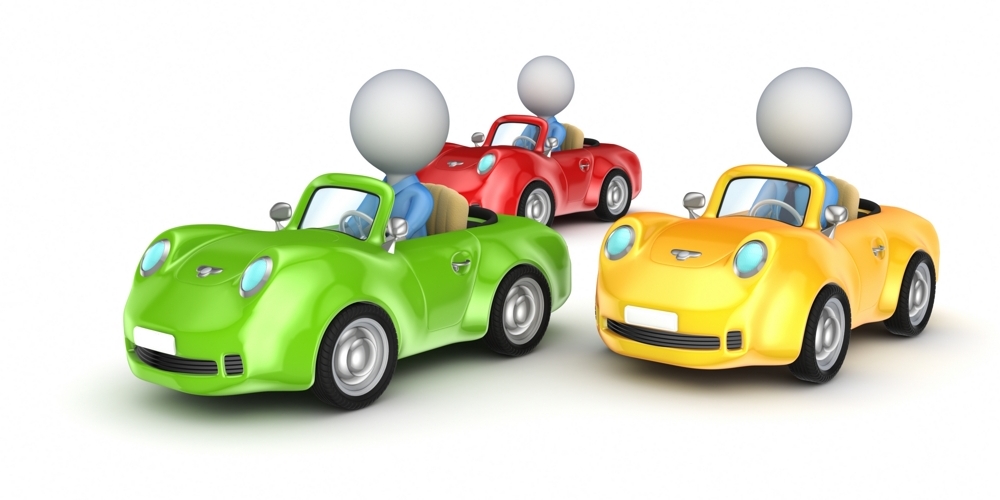
This short section has some important stuff that applies to all of your driving. Warning - there is some 'blunt' information...
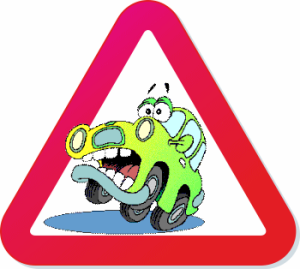
After an accident, you will often hear people say things like:
'It wasn't my fault'
'The other car came from nowhere'
'I didn't see him coming.'
What people might say, if they were either more honest or better informed, would perhaps be something more like:
'I wasn't concentrating as much as I could have been'
'I wasn't fully aware of the situation'
'I simply forgot to look to the left (right or wherever)'
Like it or not, crashes are caused by drivers' actions; if there were no drivers, there would be no accidents!
Many drivers simply shrug their shoulders and blame someone else, or maybe the road and weather, when something happens.
But in reality... The road will have potholes and be badly signposted in places, the weather will sometimes be bad, and other people will do stupid things.
This is the same for everyone. But regardless of what happens, get into the habit of asking yourself, "How could I have avoided it?" Because if you don't, it will happen again, and again, and again.
This is important because crashes are very real and very dangerous.
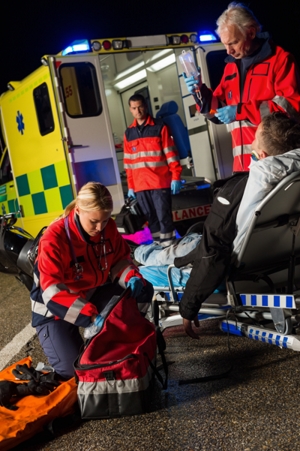
My name's John Farlam - I'm getting on a bit and have been involved in driver training since 1979, before most people reading this were born!
Before becoming a driving instructor (at the age of 24), I was involved in several accidents between the age of 18 and 22.
I wrote off 5 cars and a lorry – these were just the ones I was driving! There were at least three other cars written off.
I was extremely lucky - I was not severely injured, disabled or killed.
With what I know today, I could have avoided every one of the accidents simply by allowing more space for other drivers' mistakes.
In five of the six write-off accidents, other drivers were prosecuted for driving offences. The crazy thing was that this made me believe the accidents were their fault and that I was simply an 'innocent victim'! But it's strange that since that time, I've driven many more miles and encountered countless bad driving incidents but not crashed.
Was I just unlucky in my first four years on the road? I don't think so!
The accidents were the fault of the other drivers because they were driving dangerously - but with a bit more 'defensive thinking', I could have avoided them all.
In the sixth write off I was the only car on the road - I believed that I was the best driver in the world. Unfortunately, many young people (predominantly male) have an inflated idea of their driving abilities. They get an adrenalin buzz from speed and allow that to override any sense that they have - that was me! I was lucky to get out of the car that I rolled - so were my passengers. Many young people are not so lucky.
The reality is that while I thought I was a cool driver most other people (including girlfriends I was trying to impress) probably thought I was stupid (I was!).
It might be easy to wave your fist and swear at someone who cuts you up, and it can be tempting to try and 'teach them a lesson' but let's get real...
You could end up in the mortuary, on a slab. Sorry if that's a bit blunt, but it happens to the 1.35 million people who are killed in crashes worldwide every year. About one every 25 seconds.
I was never taught to be a 'defensive driver' or to have a forgiving attitude on the road - the reason I became involved in driver training was so that I might help others to make better and more informed choices than I did in my early driving years.
Many of us learn from experience, but believe me when I tell you that my experience of crashing is not one that you want for yourself (if you survive).
Make a choice to take your driving seriously, to use your powers of concentration, observation and anticipation to the full every time you drive.
If you want the adrenalin buzz that driving fast, drifting, and doing stunts can bring, join a club, do it on a track - not on public roads.
 A preacher?
A preacher?Am I just some 'old man' who is preaching when I say that you have real responsibilities when driving, both to yourself and others?
If you are a young person, it's possible that driving a car might be the first and most significant real responsibility in your life.
Often the road safety message gets lost because of the pompous, 'do-gooder' attitudes of some of the 'preachers'.
But please trust me when I tell you I don't wish to preach - it's your life and your choice.
But remember that crashes hurt you and everyone else who survives them.
A wise old man once said that the secret of a long life is to keep breathing as long as possible... One of the secrets of keeping breathing is to avoid distractions while driving - in other words, concentrate..
To concentrate fully, you need to be relaxed
Is your seating position OK?
Is the car too warm or too cold?
Are you tired?
Are you ill?
Are your friends distracting you?
These things are perhaps pretty basic and may sound obvious, but what about the things that many people do without a second thought in everyday driving?
There are distractions all around - it's your job to make sure that you don't (literally) fall victim to them. It has been estimated that driver distraction contributes to one in four accidents, accidents, which should be easily avoidable.
So what distractions might you be prone to?
The following should certainly not be an issue during your driving lessons. And if you want to live to a ripe old age (like me!) they shouldn't figure in your driving after you've passed your test.
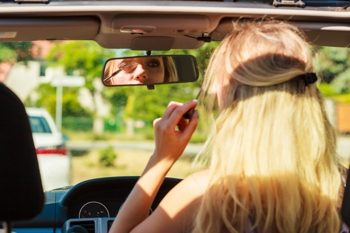
We don't have any statistics, but we are sure that someone has rolled their car into a ditch or off a cliff because they have been busy combing their hair, putting on makeup, or shaving while driving.
You might think you're looking good, but this is not 'fatal attraction', it's fatal distraction.
Eating and drinking behind the wheel could leave you with your lunch in your lap. But that would be the least of your worries if things start to go wrong.
Driving requires both hands and good observation - you can't possibly eat, drink and drive safely, no matter how 'good' a driver you are. There have been many cases where drivers have been prosecuted for eating while driving.
There is no specific law forbidding eating and drinking behind the wheel, but if the police consider that it caused a distraction the driver could face a £100 fine and three penalty points (remember that new drivers lose their licence after six points).
Let's face it - we are all attracted to other people we see walking along the street from time to time, but I can tell you from first-hand experience that it doesn't make for safe driving.
While looking at a woman on the footpath (many years ago!) I drove into the back of the car in front.
Luckily for me, there wasn't much damage (except to my wallet and my ego), and no one was hurt, but it could have been a child running out while I was distracted - that would have changed my whole life story (for the worse).
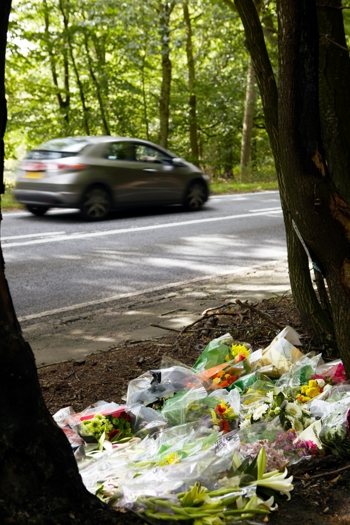 There are some tough messages in this lesson - but young drivers are at far greater risk of death or serious, life-changing injuries on the road. We don't want you to become a victim - and you don't have to be. You can be safe and secure on the roads by following our advice.
There are some tough messages in this lesson - but young drivers are at far greater risk of death or serious, life-changing injuries on the road. We don't want you to become a victim - and you don't have to be. You can be safe and secure on the roads by following our advice.
Take a look at the BRAKE road safety web site to see why young drivers are more at risk.
Driver distraction caused up to 17% of all crashes and mobile phone use is becoming the biggest killer on UK roads.
All of these things can be fatally dangerous when driving:
Prescription drugs
tiredness,
moods
arguments
kids in the car
music, route
planners and sat-nav systems
friends hustling you
stuff on your mind
phone calls (hands free still greatly increases your accident risk)
TikTok Twitter, Facebook, WhatsApp, Snapchat, Instagram, textring and other social media
The list of potential distractions is endless. You can't avoid all of them but you can take steps to reduce the danger. For example ALWAYS stop if you want to use a phone, tablet or other device or programme your sat-nav.
It can be tough to ignore your friends when they are urging you to do something stupid - but there is a chance that you will kill them if you don't. Around 5x young people (16 to 24 years old) are killed on UK roads every week with 71 getting serious, life changing injuries.
Concentration and the ability to filter out distractions is a skill that you can learn.
Using a phone for any purpose while driving is not only illegal, it increases your accident risk by 400%. Even hands-free phones are dangerous. Phone conversations disrupt your observation patterns. Some people even take notes during a phone call - the technical name for these people is 'stupid'!
Using a hand-held phone (or device)within two years of passing your test will result in a driving ban until you pass the Theory and Driving Tests again. You will also get a hefty fine.
The video below contains graphic images of a car crash - if you are easily upset please watch it with a friend or parent present. The aim of the video is not to shock or scare you, it's designed to help you to realise the reality of distraction - and to avoid it in your own driving.
The video dates back to 2008, and the phone's a bit of a relic! But the message is as relevant now as it was then, probably more so with social media and other apps that weren't around back then.
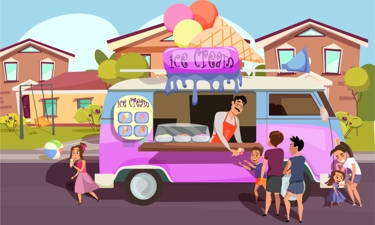
Observation means more than simply keeping your eyes open. As you gain more experience on the road, you will recognise the importance of looking 'actively'.
Active observation means that you will be on the lookout for signs, road markings, developing traffic situations, pedestrian movement and lots more besides, all the time.
Observation means spotting the ice cream van
Anticipation means being aware and prepared for what might happen
When you are actively observing, you will expect the kids to run out before they've even bought their ice creams.
You learned the basics of steering here. Now would be a good time to review the steering information; in addition, practise these five good habits, for safer observation when driving (often referred to as 'The Smith System' )
Aim high with your eyes for accurate steering
You need to keep your eyes moving and scan the whole scene ahead. One of the areas you will need to look as far down the road as possible. Doing this will help keep a steady course and position, especially when taking bends.
Get The Big Picture:
Keep a safe following distance, so you have time and space to recognise and act on the hazards around your car and ahead. By keeping back from the vehicle in front, you will see what is happening ahead of it.
Keep Your Eyes Moving:
We mentioned this above. Scan - don't stare.
Actively moving your eyes will help you to recognise changing traffic conditions and get information that you need to make good decisions.
Leave yourself an 'out':
Leave plenty of space to the front and at least one side to 'escape' in an emergency (More about being a 'space person' later in the course).
Be seen: Communicate in traffic with your horn, lights and signals to establish eye contact with motorists and pedestrians. Make sure that others have seen you and that you are reasonably sure of their intentions before committing yourself to any action.
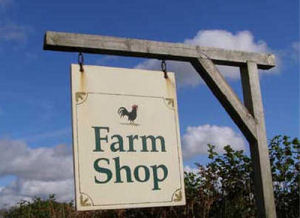
How will you react to road signs?
Road signs tell you about the road ahead, but don't tell you what's happening.
For example, a roundabout sign tells you there's a roundabout ahead. But it doesn't tell you that there's a queue traffic waiting to enter the roundabout hidden just around the bend ahead..
Spotting the signs is an excellent starting point. However, as your observation improves, you will need to develop your anticipation skills and learn to adjust your driving to fit whatever might happen next.
Spotting stuff won't help you if you don't act sensibly on what you see.
You need to develop an instinct for the dangers that might lie ahead:
When you see the roundabout sign, expect a queue
When you see a 'cattle crossing' sign in the country, expect mud on the road
When you see a school sign, expect kids
When you see a low bridge sign expect an approaching truck in the middle of the road
When you see a kid on a bike, expect his friend to appear 'out of nowhere'
The list is endless...
Think of yourself as a 'driving detective' working out the clues as you go along. As a detective, you will soon learn that it's not only the 'standard' road signs that give us valuable information.
By being prepared for any potential eventuality, you will be less likely to be taken by surprise.
The 'farm shop' sign shown in the picture is an example of the sort of thing that will provide you with information - what does it mean and what hazards might you expect?
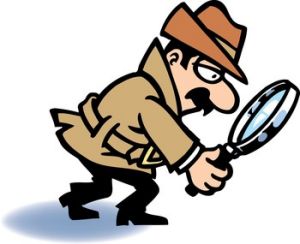
Tractors turning?
Drivers ahead slowing and turning suddenly?
Slow vehicles with trailers emerging?
Animals on the road?
Horse riders?
Mud on the road (slippery)?
Trucks turning?
Pedestrians, especially children, in the road?
A driver without good concentration, observation and anticipation will not even see the sign, let alone consider the consequences.
Lazy observation and poor anticipation? Dead easy...
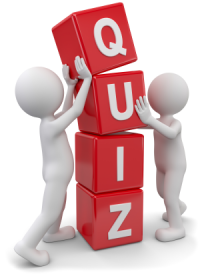 Safety tips quiz
Safety tips quizClick here to open your safety tips quiz page for printing...
This quiz is a bit different from the others you have done so far. It asks you to think about the accident situation shown below. Take your completed quiz page along to your next driving lesson and discuss your answers with your instructor.
Who do you think was responsible for the crash shown below?
The driver of the red hot hatchback was signalling left but drove across the path of driver 'B', who was unable to stop in time. There are no road markings.